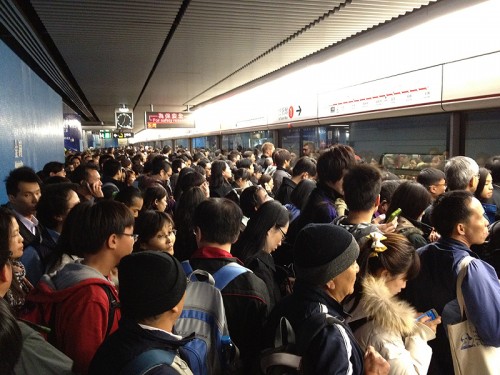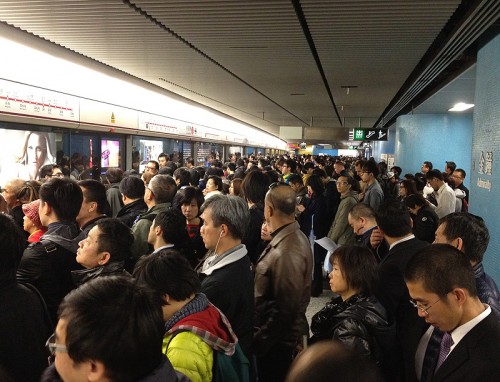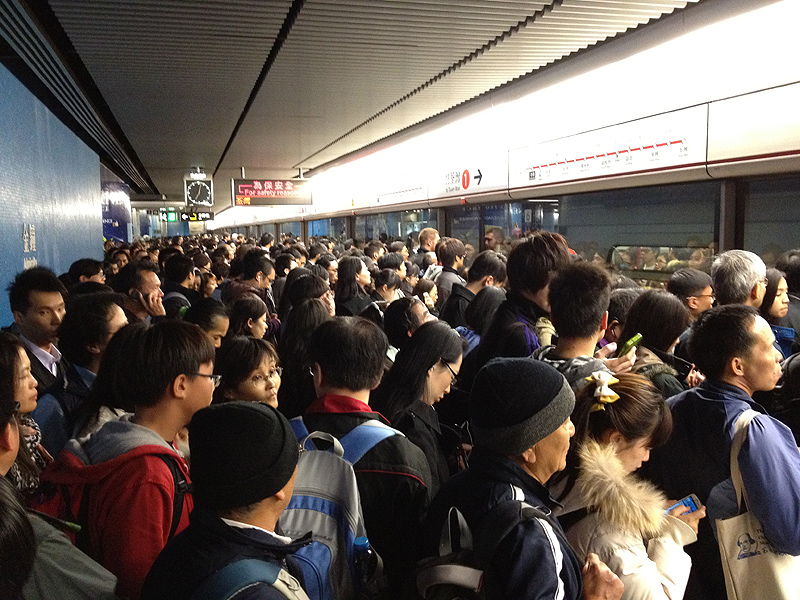
Whereas the MTR was once a fast, convenient ride from main areas of the city, it has now become a cramped, and often unenjoyable way to travel.
Despite the maneuver last year to remove rows of seats from cars to increase capacity, the congestion in the trains doesn’t seem to have thinned.
Likewise, the lines at some of the stations remain dangerously long – even during off-peak hours.
Transferring trains at Admiralty station used to be a simple, fluid procedure, but it now often makes more sense to continue on to Central and get on at the beginning of the line, thus avoiding the long lines like the ones pictured in the photos.

Aside from increasing the frequency of trains, could express trains help to restore the quality of the MTR ride?
In other international cities, express trains skip certain stations in order to transport a large number of people to heavily trafficked, central hubs.
However, is this even an option in Hong Kong? Does the MTR have additional tracks to allow express trains to run? Would it be feasible to expand the tracks in this way?
Potential express stations could include locations such as North Point, Causeway Bay, Admiralty, Tsim Sha Tsui, Mongkok, and Kowloon Tong.
With Hong Kong’s population set to grow exponentially, perhaps it’s time that the MTR started looking at solutions to maintain the ride quality in addition to expanding its service to new areas.


Interesting. Wasn’t the MTR like each 3 minutes there is a train?
Funny thing is, I’m currently studying a course on which I have to evaluate large infrastructure like these. Evaluation as in to improve future blue prints and to see relevent (financial, economic and social) impacts of this infrastructure on society.
Usually when it comes to infrastructure, the lack of capacity is mostly the reason to upgrade. First they want to utilize the current tracks into something more efficient; thus maybe more trains (each 2 minutes?) etc. If not, then the last option is to expand, but who’s going to pay these cost? Notice that the cost of expanding isn’t probably lineair to the benefit it gains – e.g. you can make the MTR longer, but the station’s capacity is already at its limits (thus there is large overhead costs hidden), or maybe the reference point of 50 meter long train, the first 20 meter expansion is benefit gained of 30%, but meters after the 20 meter will lessen with 5% for each 10 meter due to calculations.
I think, the most feasibile option is to make more MTR tracks, or increase the capacity elsewhere (trams at central etc.). Or slowly rebuild the current tracks to let double decked trains moving (but then I fear that the interval of 3 minutes will be hard to realize, too many people coming in and out).
What’s awesome though, is a future MTR train with 2 decks and 2 boarding station on top of each other – with that it’s still possible to realize the 3 minutes intervals at max peak. (cuz it’s the same, but stapled on top of each other haha). HK have not option than just extend in height with building ;P
Nice reading.
Hi James, the issue that the post was focusing on is the quality of the ride, which has deteriorated. Also, like you mention, it’s not actually as much an issue of the frequency, as it is of capacity. Currently at certain times of the day you need to wait in line as several trains pass by without room for you to board – that is the problem I was referring to.
This is one of several things that is adding stress and lowering the quality of life for average people in Hong Kong. The influx of visitors and new people is taxing the current infrastructure and eroding the daily experience of a large percentage of the population, while enriching only a small percentage. This situation has contributed to the recent ill will in Hong Kong.
Hi! Ow, it’s like that. I guess the social costs (as in too many people at same time) is taking its toll on current infrastructure. I’m sure the company is on it. Do they have in HK flexible working hours? Then maybe the chaos might lessen.